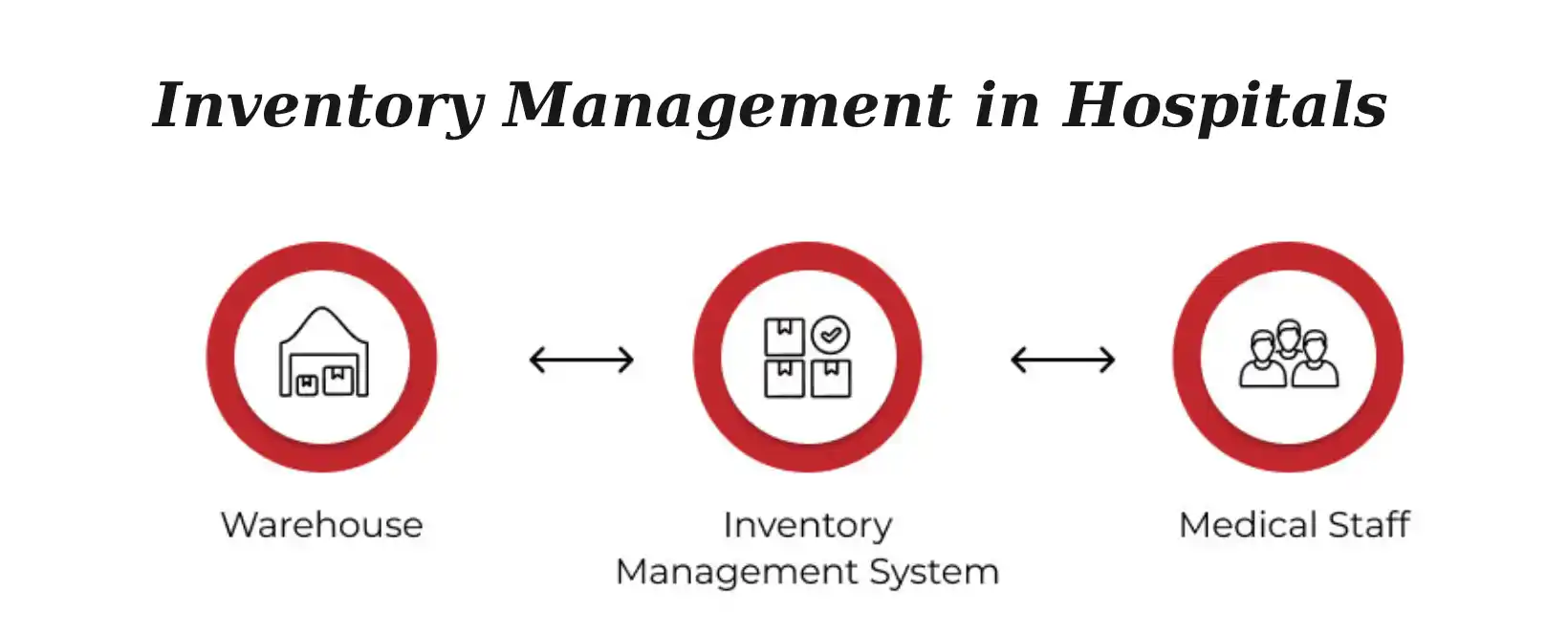Every hospital or medical facility requires an inventory to store the medicines and pharmaceutical equipment. While most hospitals are still using the traditional ways like Excel sheets to manage their inventory. Which often leads to errors and data loss. Contrarily, big and established healthcare organizations leverage inventory management software development to automate their inventory operations.
The global hospital asset tracking and inventory management market was valued at $25.28 billion in 2022, according to a report by GlobeNewswire. In 2023, the market grew to $27.27 billion. This represents a compound annual growth rate (CAGR) of 7.9%.
The report clearly depicts the surging demand for the inventory management systems to cut down labor costs and their energy dissipated in managing inventory. Furthermore, the tech backed inventory management solutions also reduce human prone errors and provide better accuracy when compared to traditional methods.
What is Hospital Inventory Management?
In a hospital or medical facility, inventory management refers to a process that supervises and controls the availability, storage, utilization and tracking of medicines and pharma equipment. With the power of technology, these systems can monitor stock levels, optimize storage, process orders and forecast the demands for medicines and equipment.
Hospital inventory management system comprises of multiple elements like barcoding, RFID tracking, and data analytics to showcase the data and make sound predictions. These systems and technologies are useful in streamlining operations, maintaining stock levels, automated processes and avoiding overstocking. Leveraging a hospital inventory management system, healthcare organizations can provide the necessary medical services and resources to the patients.
Key Aspects of a Hospital Inventory Management Software
- Storage and Distribution: Arranging the stuff and maintaining the storage facilities is the primary aspect of an inventory management system. It also ensures the medicines are stored at optimum temperature and environment. Also, it ensures that everything kept in the inventory is promptly shared among the hospital staff.
- Tech and Automation: With the incorporation of technology, an inventory management system now has the capability to scan bar codes and RFID (radio frequency identification) tracking. Furthermore, there are a few more features that streamline inventory operations, ensure precision, offer real time visibility and automate processes.
- Inventory Optimization: It requires inventory data to optimize the inventory processes. Utilzing an inventory management system allows easy identification of excessively stocked items, removing expired items, knowing the exhausting items.
- Procurement and Ordering: With a streamlined procurement process it is easy to stock the items, connect with genuine suppliers, negotiate on quotes, place and receive an order and maintain good relations with the vendor.
- Demand Forecasting: Utilzing the data and predicting the demands is an important feature of the inventory management system. With the help of past data, patient trends and treatments, the inventory management system can accurately reveal the future demands.
- Inventory Tracking: An inventory management system ensures that you have stocked up optimum level of medicines and pharmaceutical equipment. Moreover, the system also keeps a track record of everything that goes in and out along with their quantity, location and expiration date.
Why is Hospital Inventory Management Important?
Hospitals need to track inventory items like medicines, equipment, and patient details. An Excel sheet may seem ideal but isn’t sufficient. In healthcare, accuracy and time are crucial and cannot be overlooked. A structured workflow is necessary to meet these demands.
That is where an inventory management system comes into the picture. It promotes precision, saves time, money and labor. With the help of inventory management software development, medical organizations can cut down their operation costs, streamline operations and provide better healthcare facilities to their patients.
By setting up a strategic plan and consistent monitoring, hospitals can improve their existing services and treat their patients efficiently. A strategic plan of providing the right items at the right time saves precious lives in case of an emergency. Moreover, it saves the resources and costs associated in the surgical process by assuring prompt availability.
An inventory management software creates an organized process for monitoring buy/sell requests and transactions. It helps track revenue, stock levels, and prescriptions efficiently. This organized system reduces supply and financial loss in hospitals. It achieves this by keeping a record of all related processes.
Advantages of Hospital Inventory Management:
- Contract Compliance: An inventory management system ensures that you are stocking the drugs, medicines and pharma stuff that is legal and doesn’t require any permissions. Moreover, the software also reveals the optimum quantity of medicine you can keep in your inventory without getting into any trouble.
- Digitalized Data: With an inventory management software, data can be stored on the cloud or local storage. It eliminates the chances of human prone errors and reduces the reliance on paper-based operations. Furthermore, the data stored digitally can be easily edited whenever required and can be arranged in any manner depending on the situation.
- Enhanced Communication: An inventory management system sets up smooth communication among the administrative teams and other healthcare teams. Staff members can discuss about the medical requirements and share them with the team managing the inventory
Challenges Occurring in Inventory Management
In hospital inventory management software, challenges occur every day. Let us discuss few of them:
- Sorting the Drugs and Medicines: Arranging and sorting the medicines is an important task in a medical inventory. Moreover, physicians often spend their time in searching for the right drugs which often causes hassle during the tough times.
- Pharmaceutical Shortage or Delay: During emergencies, enough medicines and medical equipment are needed to treat the patients. Therefore, it is critical to maintain significant stock levels that are promptly available for efficient treatment.
- Monitoring the Expiry Dates: When large quantities of medicines and drugs are stored in an inventory, it is crucial to track their expiry dates. Stuff that has a nearby expiry date should be exhausted before the medicines become useless.
- Changing Demands: Maintaining the optimum stock levels of medicines and pharmaceutical items is necessary for treating patients in a better way. But the biggest concern lies with the changing needs of the medicines at a hospital.
- Overstocking: During the tough times, hospitals and medical institutions stock up a lot of medicines and equipment. Often, they are used and sometimes they are not. If the stuff is unused, then it might expire and needs to be disposed of. Furthermore, it also creates a shortage of items in the medical and healthcare ecosystem.
Inventory Management in Hospitals
Usually, hospitals and healthcare institutions rely on digital inventory management systems that are tailor made according to their requirements. It tracks the details of every incoming and outgoing item and arranges the data, making it more readable. In addition, such hospital inventory management software development enable to keep a record of total sales and expenditures to calculate the ROI.
In any hospital or healthcare facility, medicines, drugs and surgical equipment are the widely utilized resources. Keeping the optimum stock of all these items is often challenging if the management team is still utilizing obsolete ways like Excel sheet or paper-pen for inventory management.
Furthermore, the medical facilities need to ensure that they are keeping every item for meeting the demands during emergencies. Accessibility also plays a vital role in such scenarios; the software reveals the precise details for easy access to medicines and pharma equipment.

Undoubtedly, reliable hospital inventory management software helps in dealing with every potential issue that we have discussed above. It is the best way to get rid of outdated tracking and monitoring methods. With the system it is to get greater control over the inventory management equipment as well. Usually, hospitals and healthcare facilities choose cloud-based inventory management systems backed with high security.
The Bottom Line
For leading a disease-free life and ensuring physical and mental fitness, healthcare sector plays a major role in everyone’s life. However, for the survival in the healthcare sector, hospitals and medical institutions need to opt for robust inventory management systems. These systems not only simplify the inventory operations but also promote efficient management. Additionally, they contribute in organize the mess created by the incoming and outgoing medicines, drugs and other pharma consignments. The only reliable way to beat the inconsistency and mismanagement in an inventory is to choose custom software development services and get personalized hospital inventory management software development. It reduces human prone errors and saves the critical resources for needy patients.







